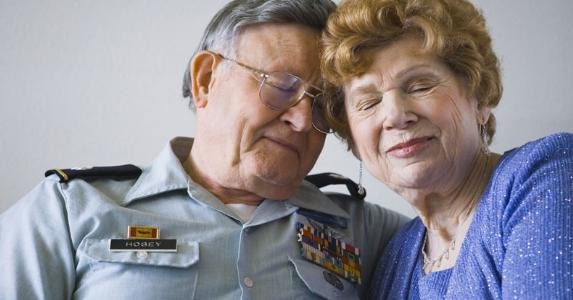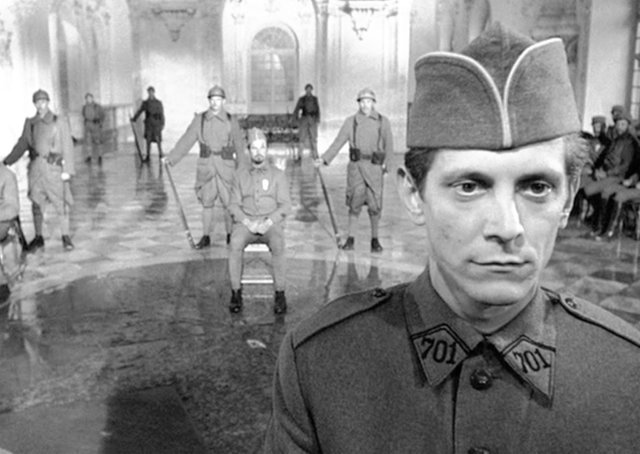Libertarian Military: Widthdrawal of Our Troops

As is commonly known, the United States Armed Forces is a product of state socialism. It’s been used against the anti-socialist neocons since the end of the Bush era, but never seemed to serve as a caveat for antiwar and noninterventionist libertarians—in fact, it’s a talking point that is foolproof in attracting converts—but there have yet to be proposed any free market solutions to a program that is arguably essential to the security of a society that is unanimously envied and insusceptible to any imminent threat, whether it be foreign or domestic, because such a program exists.
The USAF is quite possibly the strongest defense agency in the world, if not, that the world has ever known, despite its shortcomings—the collateral damage caused by drone strikes, the needless deployment of troops to Germany and Japan, where there is no conflict, etc.—but despite the libertarian solution to state policy being privatization, such is not the case with military. Unlike roads and infrastructure, national security is not provided through private contractors, which means that it will disappear along with the state. In a manner of speaking, the military is not socialist because it’s funded through taxes. It’s socialist because it is one giant government union.
This concept is very difficult to delineate. The military provides a service and the means of said production, while owned by the government, would essentially fall apart without the soldiers that comprise the organization. A capitalist would say that this is an instance of state socialism since the means of production, in this case, are not privately owned and rightfully acquired earnings are used to fund it. A socialist would say that this is an instance of state capitalism since the state plays the role of the capitalist in exploiting the soldiers, or workers, to make a profit whilst giving the commands from (military) headquarters. This is where we reach an impasse, but the idea that the military is a union is certain.
For this very reason, in order for a libertarian social order to maintain the security and protection of the people a union militia would have to be established, rather than a corporate militia. The state military is not centralized by a private sector because very few people are willing to pay for their services despite actually needing them, in the same way that they will not pay out of pocket for road networks or railroad systems that are provided by the state, as it would be an inconvenience with the current mode of taxation. However, private contractors can be hired by the state to build these projects because there are tradesmen who can be used for such labor. The state is ultimately powerless without its military, police forces, and courts, but while extrajudical courts and private police forces can be formed, a military cannot be formed or maintained any other way but through conscription, promises of benefits or gratuities, or patriotic propaganda.
How They Will Function
Benefits and Recruitment

The offering of pensions would help in the recruiting process, considering the hardship the members would have to endure. This process is very similar to hiring halls that are organized by labor unions. Background checks are also conducted thoroughly and determine whether or not the new recruit will be allowed to join the union. Both recruiting processes involve background checks and in this case, criminal history may be scrutinized, but a curriculum vitae might not be required, in the event that the new recruit is joining without any prior work experience. This, of course, is a reflection of the current recruitment process that operates under the state and as a result, one of the main critiques of the military is its exploitation of the poor and uneducated to fight on the frontlines, so alternatively, a curriculum vitae might be required for service to maintain higher standards for recruitment and ensure a taut squadron.
A large-scale militia and a strict recruitment process would allow for more pensions to be issued to soldiers and further incentivize funding for veteran’s assistance hospitals and J/ROTC programs in schools and colleges that will allow it.
Court-martials and Military Reserves

Union cards could be issued so that military personnel can be authorized to purchase high-grade weapons. Penalties regarding misuse of these weapons would either be grounds for dismissal, revocation of one’s union card, or a court-martial hearing. Military courts are also a great example of extrajudicial, or private courts because they penalize offenders based on business policy—in this case, martial law—rather than established law. Obviously, an independent military would have to be large enough to enforce such policy.
Death by firing squad is not the same as, say, dragging a rude guest into one’s basement to be tortured, and it does not violate the non-aggression principle. Bodily autonomy is under duress when torturing is implemented by one’s fellow man because rights were not signed away when the is invited into the house. Conversely, if the policy of the union militia is to mirror the military code of the USAF, there are rights that will, indeed be signed away upon enlistment. Willfully signing away one’s rights through a voluntary contract is not a violation of the non-aggression principle, and incidentally, there will be a private court to enforce it. (Funny how the same people who tell us that eliminating the state means eliminating the military also bring up the life-raft dilemma.)
These terms are likely to be promulgated due to rules of engagement, concerning military reserves and tours of duty. Military reserves are much like labor strikes, in that they are mandatory and a last resort. When there is a threat, those called must engage, lest they be court-martialed or discharged dishonorably for desertion of their post, in accordance with martial law:
(a) Any member of the armed forces who—
(1) without authority goes or remains absent from his unit, organization, or place of duty with intent to remain away therefrom permanently;
(2) quits his unit, organization, or place of duty with intent to avoid hazardous duty or to shirk important service; or
(3) without being regularly separated from one of the armed forces enlists or accepts an appointment in the same or another one of the armed forces without fully disclosing the fact that he has not been regularly separated, or enters any foreign armed service except when authorized by the United States;
is guilty of desertion.
(b) Any commissioned officer of the armed forces who, after tender of his resignation and before notice of its acceptance, quits his post or proper duties without leave and with intent to remain away therefrom permanently is guilty of desertion.
(c) Any person found guilty of desertion or attempt to desert shall be punished, if the offense is committed in time of war, by death or such other punishment as a court-martial may direct, but if the desertion or attempt to desert occurs at any other time, by such punishment, other than death, as a court-martial may direct.
Now, say a man, for some reason, does not want to be protected by a union militia, thus deeming their actions a violation of the nonaggression principle. If his reason is autonomous defense, he should have no problem retaliating against a homegrown attack. (Not much can really be done on his part if tours are being conducted abroad.) Of course, he would be essentially crossing the picket line and thus, be at the mercy of all members of the corps; friendly fire will not be enforced if he is killed. If his reason is disagreement with war, he is by all means within his rights to protest, but anything more drastic is likely to result in his death.
Declaration of War
Interventionism violates the nonaggression principle, but retaliation does not. However, it would be best to avoid war as much as is humanly possible. This is another benefit to unionizing the militia, rather than incorporating it. Corporations, admittedly, cannot be trusted with conduction of military practices and who exactly will they pay who works within the union?
Branches and Ranks
The union militia, would have to be a rank-and-file union and the ranks, if the policy of the militia is to be consistent with union policy, should be selected democratically. However, a ranking system of some sort would be imperative if recruits are to be trained correctly and union representatives are to be dispatched; it would be senseless to dispatch a first-class private for recruiting office or to deploy an trust an unskilled marksman with a sixth-generation jet fighter.
Branches of military will obviously need to be established, so that many functions can be carried out.
Why Do We Need A Military?
One of the many dilemmas proposed by those skeptical of libertarianism is the warlord dilemma. Yes, warlords are usually products of government, but competitive polities are very much likely to conquer a defenseless free society and a well-regulated militia, rather than an organized militia is the best way to combat a threat and maintain freedom.
Unionizing said militia is arguably the best route that can be suggested in a stateless society. Military is a service that is a great need, but in low demand. Paying for defense from the military is absurd, but a brotherhood of soldiers looking out for the best interests of each other is certainly realistic and there are plenty of people who are willing to engage, if not for the pensions, at least for the discipline.

Very interesting take on the subject.
Much better than the usual "soldiers are thugs" nonsense that gets spouted a lot.
I don't have a lot of comment on your ideas now, but hopefully I'll put enough brain cells together to take a shot at it soon.
Followed.
Thanks, Steve. So many problems are offered by voluntaryists, but so few solutions are put forth. They’re so blinded by what is essentially postmodernism that they don’t realize that soldiers are in a binding contract out of which they cannot opt when they’re in the reserve and killing children is never ideal, nor is it the impetus of their enlistment. These are people who want discipline and feel like they are worth something, especially those who come from dysfunctional and destitute circumstances. A state that offers them benefits offers them a way out and it’s our job to replace that state.
the reason that there are so few solutions is that humans are the basis of government, and humans are complex and flawed.
ANY governmental system, including pure anarchy, has to take that into account.
Since so many folks, NOT just anarchists, and more often than not statists, don't take that into account when discussing problems and solutions, there can't be many rational solutions reached.
I certainly hope my solutions will suffice even though they seem a bit utopian.